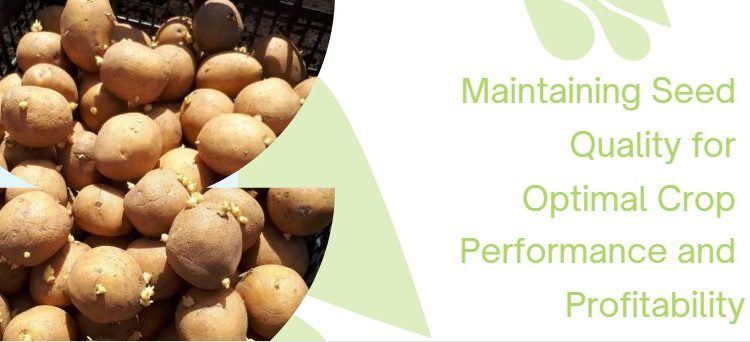#SeedQuality #CropPerformance #Profitability #SeedStorage #DiseaseCertification
The quality of seeds plays a crucial role in determining the yield and overall performance of a crop. When it comes to potato farming, seed quality is of utmost importance as it directly impacts the yield and quality of the subsequent crop. This article explores the significance of seed quality, proper seed storage techniques, and the consequences of neglecting seed quality and disease certifications.
Starting with high-quality seed is essential for achieving desired crop outcomes. Poor-quality seed can severely hamper both yield and quality, and there is no remedy during the growing season to compensate for such deficiencies. As seed accounts for approximately 30% of the input costs associated with growing a potato crop, it becomes crucial to invest time and money in obtaining high-quality seed to maximize returns.
Storing Seed Properly:
Proper storage conditions significantly influence seed quality. Ideally, potato seed should be stored at temperatures between 2°C and 4°C. Higher temperatures can accelerate physiological aging in tubers, leading to adverse effects on stem number, tuber set, tuber size, and subsequent crop yield. Maintaining uniform temperature distribution within the storage facility is vital. Temperature variations within the storage area can result in different physiological ages within a given seed lot. It’s worth noting that refrigeration damage may occur if there are pockets of very low temperature, such as under the cool air inlet.
Carbon Dioxide (CO2) and Its Impact:
Carbon dioxide build-up within the seed storage area can have detrimental effects on tuber quality. Elevated CO2 levels can promote rotting and blackheart in tubers. Stored tubers respire and generate CO2, with the respiration rate being influenced by temperature and the physiological state of the tubers. Tubers exhibit increased respiration rates with higher temperatures and handling activities like harvesting and grading. Curing, wounded tubers, and sprouting tubers also contribute to increased CO2 production. Proper airflow and ventilation in the storage facility are necessary to prevent CO2 accumulation, ensuring stable temperature distribution, oxygen supply, and removal of excess moisture.
Importance of Disease Certifications:
Diseases can significantly impact the yield and marketability of potato crops. Certification programs play a crucial role in ensuring that diseases do not reach levels that compromise crop yield or marketability. Some diseases, such as bacterial wilt and potato cyst nematode (PCN), require complete exclusion to prevent disease spread and yield loss. Under the National Standard for Certification of Seed Potatoes, fields used for certified seed crops are regularly tested for PCN, providing ongoing assurance of a “PCN-free” status. Disease-free certifications are essential for maintaining crop health and reducing the risk of yield loss.
To maximize crop performance and profitability, farmers must not leave seed quality to chance. Investing in high-quality seeds, adhering to proper seed storage practices, and obtaining disease certifications are fundamental steps in ensuring optimal crop outcomes. By prioritizing seed quality, considering physiological age, and obtaining necessary disease certifications, farmers can enhance their chances of achieving a successful potato harvest while minimizing yield loss and marketability issues.
Source: Australian Potato Growers







